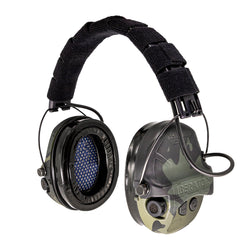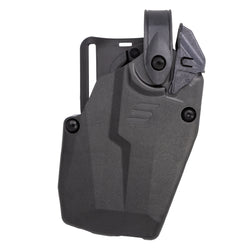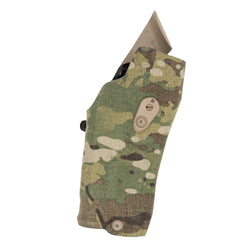If I say “old school cop gun,” what do you picture? I guess it depends on what you grew up around. For me, it’s the S&W Model 10—a six-shot, medium-frame .38 Special revolver. Honestly, it makes me feel a little old to admit that the S&W 5906 qualifies as an old-school cop gun these days. Production started in 1989, which makes the design 35 years old.
The 5906 and that Old School Cool
How can a DA/SA, double-stack, 9mm semi-auto pistol count as old school? And yet, here we are. The 5906 is part of the S&W Third Generation of semi-auto pistols.

Guns like the Third Generation—and to a lesser extent, the Second Generation—replaced the classic six-shot .38 Special revolver in the holsters of police forces around the country.
The 5906 does show its age, most notably in its all-metal design. S&W built it from stainless steel, and it’s a hefty gun, weighing in at 40 ounces. For comparison, the Glock 19—similar in size and capacity—weighs just 23.63 ounces.
As much as it makes me feel old, the DA/SA design is also dated. And as much as I love the action, the striker-fired system has benefits you can’t ignore.

Attaching flashlights to guns was a somewhat foreign concept for police in 1989, so don’t expect a rail. Well, there was the rail-equipped 5906TSW—but TSW models are rare and much less common than the standard versions.
What about optics? Yeah, at the time, no one outside of high-end competitors were doing that, and they were doing it in some very odd ways. Red dots on duty and tactical pistols just weren’t a thing while the 5906 was in production.

With that said, the 5906 was progressive for its day. In 1989, it was hot stuff, and it was American-made. Glock existed, but polymer-frame, striker-fired guns weren’t dominating the market yet.
The Germans released the SIG Sauer P226, Beretta had the 92FS, and America had the S&W Third Generation guns.
The 5906 In-Service
The 5906 and its variants were popular around the world. Many of the 5906s currently on the market are police trade-ins. This has long made them affordable options that, while dated, are still competent and capable.
Domestically, the LAPD, NYPD, Austin PD, and Chicago PD all adopted the 5906 or one of its variants. The NYPD, for example, picked the DAO version, the 5946. That’s not even counting the many smaller agencies that also issued the 5906 series.

The 5906 found success worldwide. The Japanese Coast Guard and the Royal Bahamas Defence Force adopted the pistol. The Chinese National Police Agency adopted the 5904 variant. The Canadian Royal Mounted Police adopted the DAO version.
Downsides of The 5906
The 5906 is a product of its time, and with that comes a few drawbacks. One is the aforementioned weight—a hefty 2.5-pound gun isn’t exactly carry-friendly, even for duty use. The grips are relatively wide, too, which is fine for me but likely made the weapon challenging to shoot for those with smaller hands.
The gun came with a magazine safety, which I’ve always despised. Magazine safeties prevent the gun from firing when the magazines are removed. The magazine safety can be removed easily enough.

S&W also went with a safety that doubled as a decocker. It’s a bit much as far as safety devices go, and they would have been better off picking one or the other. I’m also not a fan of slide-mounted safeties. They tend to be tough to reach and challenging to manipulate quickly.
S&W must have gone shopping for the absolute smallest magazine release they could find for this gun. It’s superbly small, and compared to the gun’s overall size, it looks even more absurd.
Shooting the Stainless Wonder
The S&W 5906 is an interesting gun. The recoil impulse is remarkable. There’s practically no felt recoil in the hands or wrist—it’s soft shooting, and the 2.5 pounds of steel eats up the recoil.
There’s a relatively moderate amount of muzzle rise. While you could blame the high bore axis, it has more to do with the weight of the slide reciprocating. It’s a hefty chunk of stainless steel, and I was surprised at how much the gun bucked in my hand.

You can control and shoot the 5906, but it can be challenging to control when it comes to one-handed shooting. If you have a poor grip, the gun will take advantage of you.
The trigger impressed me. The double action is long and heavy but smooth and very revolver-like. It makes sense that they chased that feel, since plenty of officers were switching from revolvers to automatics at the time.

The single-action trigger is also lovely. It’s got some takeup, but it is smooth and light. Much like the double action, I was impressed when I walked away.

The sights on this model are adjustable, but I left them as-is since I was hitting where I aimed. Overall, the accuracy was fairly good. At 25 yards, I could keep a gong swinging, and out to 50 yards, I could consistently hit man-sized steel torsos.
Going Fast
Does the gun stay accurate when we go fast? With the 5906, I won’t be getting sub-two-second Bill Drills anytime soon. The muzzle rise can quickly take you off target if your grip and stance aren’t dialed in.
I can keep all six shots on target, but my speed drifts quickly into the three-second zone. I’ve never conquered a sub-two-second Bill Drill, but I’ve sat at the under-three-second table for some time.

The sights seem easy to track despite the muzzle rise, and the light, short trigger makes it easy to shoot the gun reasonably fast. The 5906 handles OK, but it’s easy to see why no serious competitor used a S&W 3rd Gen.
That said, I’m confident this gun could serve as a duty and defensive weapon. If you were to find one reasonably priced, the 5906 would be a very competent defensive pistol. I’m nitpicking the gun here—and doing so from a modern perspective.

Ultimately, the 5906 is soft enough to shoot, controllable enough, and undoubtedly accurate and reliable enough to get the job done. The 3rd Gen Smiths are stout, robust guns that will stand the test of time.









